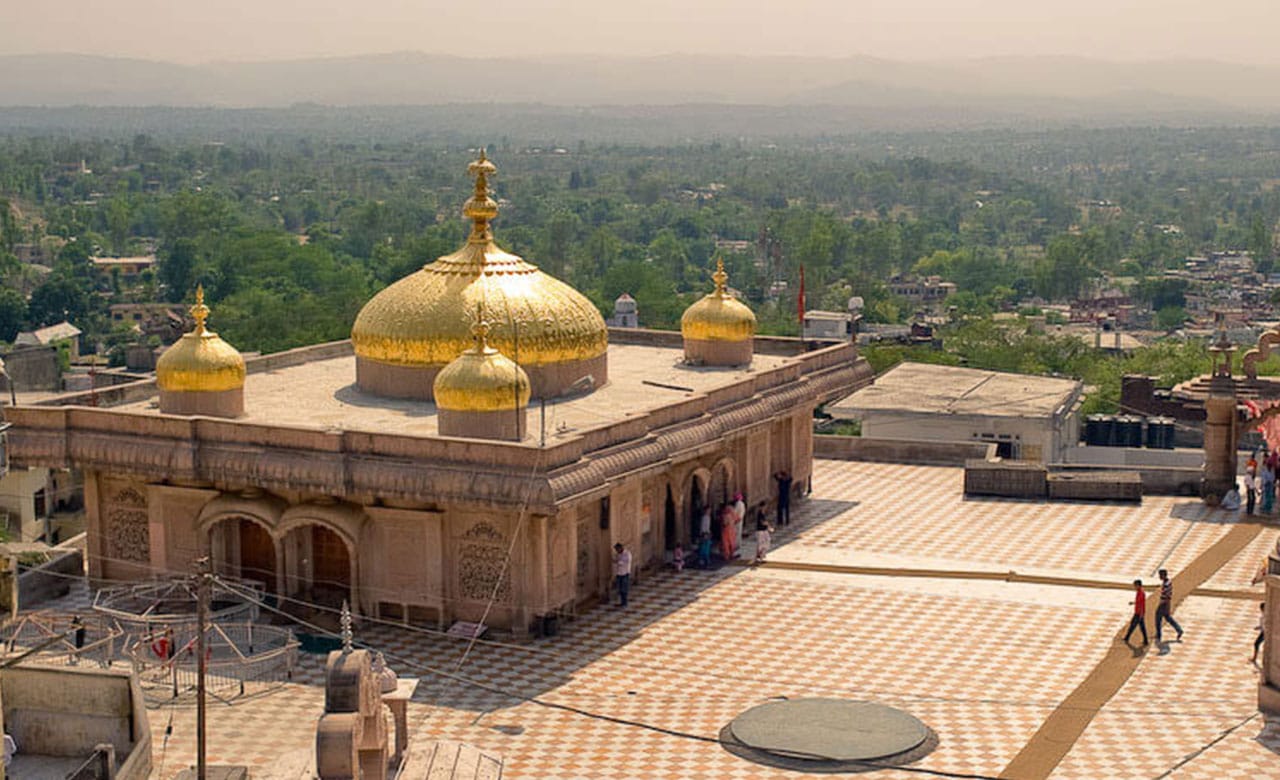
Informative
Most powerful tantric temples of India Series | Part 6-Jwalamukhi Temple
Himalaya. The roof of the world. Abode of the gods. Many legendary stories begin and end here. The spiritual history of the world is incomplete without considering the Himalayas. Many secrets and miracles lie here patiently, waiting to be discovered. One of them is the Jwalamukhi temple, located in the Himachal state of northern India.
As you step out of the airplane, landing on the short airstrip of Kangra airport, cool breezes coming directly from the Himalayas freshen you up. You get out of the airport, in a taxi, taking you 40 KMs south towards village Jwalamukhi, named after Mother Goddess Jwala Ji.
Legend
Carrying the dead body of his beloved wife Sati, Shiva started roaming around on earth, with extreme agony. Due to his wrath and anger, the earth started to shake. To save all the earthlings from Lord Shiva’s anger, Lord Vishnu, with his Sudarshan Disc severed the body of Sati in 51 pieces. Different body parts fell in different places. Each one of these 51 holy places is called Shakti Peeth. A power center. The place where the tongue of Sati fell, today known as Jwalamukhi temple.
History
Even though the origins of the temple are unknown, the temple has a rich history. Apart from Maharaja Kharak Singh and Maharaja Ranjeet Singh, it is said that Mughal emperor Akbar visited here once, after listening to the stories of the Goddess. He tried extinguishing those flames but was unsuccessful. Feeling impressed and devoted, he donated a golden parasol to the Goddess, which is kept in a glass case for display these days.
Architecture
The temple has a main building of Jwala Ji and a dome of copper and gold. The golden dome we can see today was donated by one of the most dedicated devotees of Jwala Ji. He was none other than His Holiness Maharaja Ranjeet Singh, who donated the golden gilds to Mother Goddess in 1815 AD.
The door of the temple is made up of silver plates, present to the Mother Goddess by Sikh King Kharak Sigh. There are several other shrines, built-in Indo Sikh architecture, coated with marbles.
The main temple has a square-shaped Mantapa, with three feet deep pit, surrounded by a pathway for circumambulation. The pit is covered with silver plating, with carvings on it. Inside the pit, you will find a hollow rock, surrounding an everlasting flame, representing the fiery mouth of Mahakali.
Just beside the main temple, you will find another temple called Shaiyya Bhavan. A pink-walled building, and adorned with three domes, where, with rituals, Mother Goddess goes to sleep every night.
A few hundred feet uphill to the Jwala Ji temple, you can see the temple, dedicated to Mother Goddess Tara, second of the Das Mahavidyas.
Eternal Flames
Apart from the sacred flame of Mahakali, there are eight other flames, scattered all over the temple building, associated with Mother Goddesses Annapurna, Chandi, Vindhya Vasni, Maha Lakshmi, Saraswati, Ambika, and Anjana Devi. These flames keep on changing colors from time to time, making devotees believe that those are the moods of their beloved Mother Goddess.
Some believe it is a miracle, few treat it as a mystery and try to solve it.
Gorakh Dibbi
Apart from the eternal flames, there is another interesting phenomenon that happens here. There lies a pit inside the temple, filled with water. The water inside the pit will be constantly boiling. The interesting thing is, the water will be as cold as ice. You can immerse your hand in it.
Natural gas is bubbling out from the water, making it look as if the water is boiling. If you ask the temple priest, he will ignite the matchstick. As soon as he takes that flame near the boiling water, BOOM. There will be a small blast of fireball with blue flames, going up to the roof, with the devotees exclaiming, Jai Mata Di. Jai Jwala Ji.
Being among the 51 Shakti Peethas, it is believed that Sati’s tongue fell here. Since then, the Jwala Ji temple is considered a powerhouse for celestial feminine energy.
Eternal flame, burning through centuries, is praised here, as a symbol of the divine. Fire plays a very important role in the materialistic as well as in the spiritual life of a human being. In Hinduism, the flame is considered a symbol of both life and death simultaneously.
The fire has not only brought us food, protection, and technology, but it has also given us a chance to illuminate ourselves from within. Humans have gained valuable awareness, glancing, and observing the flames.
You will be surprised to know that in Tibetian Tantra, the inner fire is called Tummo, where a literal translation of Tummo is brave female, a representative of a nonduality. Eternal flame Tummo, is the brave one, as she effortlessly shatters the illusion of duality, and superstitions, making you one with the divine.
Gorakhnath was a great saint in 11th century India. He is known as a founder of the Nath sect in Hinduism, which is a combination of Tantra, Vaishnavism, and Shaivism. He used to come here, right in this ancient temple, to meditate, and practice his tantric rituals. Since then, this temple has been considered as the hub for Tantra worshippers.
Considered as a unique powerhouse, where nine flames, representing nine forms of Mother Goddess keep on burning, the Jwala Ji temple, located on the slopes of Himalaya in Kangra, Himachal has a huge religious significance. Thousands of devotees gather every year, to pay homage to their Mother Goddesses, to get her blessings.
During the Navaratri, the temple is packed with devotees, from all around the globe.
Some arrive here to meet Mother Goddess Mahakali, who makes her devotees free from fears and troubles in life. Known to be a preserver of nature, she is known to absorb the consciousness of her children into her blissful embrace.
Some arrive here to meet Mother Goddess Annapurna. They believed that the house where Mother Goddess Annapurna bestows her blessings, overflows with the riches and grains. She is known to bless her devotees with nourishment, not only to our physical form but also concerning spiritual wisdom and renunciation.
Some arrive here to meet Mother Goddess Chandi, to gain her blessings and protection over the evil deeds of their enemies. They believe that Mother Goddess helps them to become free from the tyranny of thoughts, maintaining the sanctity and purity of the subconscious.
Some arrive here to meet Mother Goddess Durga, the Goddess of unlimited strength. Considered as a mother of three worlds, Mother Goddess Durga is known to bestow auspiciousness in the world.
Some arrive here to meet Mother Goddess Vindhya Vasini. Being the incarnation of Mother Shakti, she is known as the liberator, who liberates her devotees from all kinds of sins, and immoralities, along with the blessings of good health and protection.
No matter why devotees gather here, everyone has a unique problem, unique resolution, and a unique blessing to get. But one thing is for sure, that whenever they leave this place, they always look hopeful, blessed, and in bliss, to come back next year, thanking their Mother Goddess for the blessings she has bestowed upon them.
-Today, getting in a comfortable position, with your eyes closed, when you sit for meditation, we request you to visualize the ancient, eternal burning flame of Mother Goddess Jwala Ji in front of you.
-Feel the warm embrace of that flame, spreading within you, as it purifies you from within.
-Chant a powerful mantra given by His Holiness Shree Chamunda Swamiji, ‘Klim Kalikaye Namah’ to remove negative energy from your Sukshma Sharir. Meditate, visualizing Shiva-Shakti.
-Chant the mantra 54 times, counting with a rosary.
-Ask the Mother Goddess, to destroy every negative power laying within you.
-Ask that Queen of the Queens to bestow her protection on you.
Hidden on the slopes of majestic Himalayas, for thousands of years, Jwala Ji has kept the flames of spirituality, heritage, and traditions ignited in the hearts of the devotees.
We request you to visit this powerful Tantric temple at least once in a lifetime, to experience its spiritual reverberations.
Please write to us at info@ChamundaSwamiJi.com to get more information on Tantra, Mantra, and meditation.
Do not forget to subscribe to our blog to receive information related to Tantra, Mantra, Temples, and Meditation in the future.
Jwala Mata Di Jai.
Post a Comment
-
Subscribe to Our Blog
-
Categories
-
Popular Articles
- Dead moth in the house. What universe is trying to tell you?
- Spiritual Meaning of Moth
- Vivah Bandhan Curse – What Is It and How to Spiritually Heal It.
- The Dasa Mahavidyas
- What are Beej Mantras?
- Tripura Sundari | The Dasa Mahavidya
- Maa Bhuvaneshwari | The Dasa Mahavidyas
- The Five Shades of Tantra
- Ramakrishna Paramhansa – The Man who almost became a Woman
- Maa Chinnamasta | The Dasa Mahavidyas



